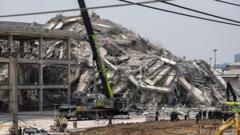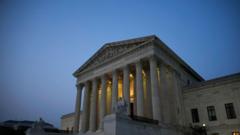The recent executive actions aim to streamline the approval process for new nuclear reactors and promote their deployment on federal lands.
Trump Accelerates Nuclear Power Plant Development with New Executive Orders

Trump Accelerates Nuclear Power Plant Development with New Executive Orders
In a bold move, President Trump initiates steps to fast-track nuclear energy projects to meet the growing demand for electricity.
May 23, 2025, 3:54 p.m. ET
In a significant shift in energy policy, President Trump unveiled four executive orders aimed at expediting the construction of nuclear power plants across the United States. These orders prioritize the approval process for advanced reactor designs, promising to expedite their deployment despite a general lack of empirical evidence regarding their safety and efficacy.
One notable order instructs the Nuclear Regulatory Commission (NRC) to simplify its regulatory framework, mandating a maximum approval timeframe of 18 months for new reactor applications. Additionally, another directive calls for the Energy and Defense departments to assess the viability of constructing reactors on federal and military properties, potentially allowing these agencies to establish more efficient approval protocols, independent of the NRC.
“This is a landmark day for the nuclear sector,” expressed Doug Burgum, Secretary of the Interior, who was present during the signing event at the Oval Office. He emphasized its importance by stating, “This will fundamentally change over five decades of unnecessary regulatory bottlenecks.”
Upon taking office, President Trump declared a “national energy emergency,” citing an inadequate electricity supply to accommodate the escalating needs of data centers crucial for artificial intelligence and other sectors. Although much of the administration's previous focus has favored fossil fuels like coal and natural gas, there has been a notable inclination towards expanding the role of nuclear energy.
The pursuit of nuclear power enjoys support spanning across party lines in Congress. While certain Democrats remain hesitant due to safety concerns and nuclear waste management, a growing faction is recognizing nuclear energy as a viable alternative given its lack of carbon emissions. Republicans advocate for nuclear energy’s reliability, highlighting its capability to provide consistent power compared to intermittent renewable sources such as wind or solar.
In a significant shift in energy policy, President Trump unveiled four executive orders aimed at expediting the construction of nuclear power plants across the United States. These orders prioritize the approval process for advanced reactor designs, promising to expedite their deployment despite a general lack of empirical evidence regarding their safety and efficacy.
One notable order instructs the Nuclear Regulatory Commission (NRC) to simplify its regulatory framework, mandating a maximum approval timeframe of 18 months for new reactor applications. Additionally, another directive calls for the Energy and Defense departments to assess the viability of constructing reactors on federal and military properties, potentially allowing these agencies to establish more efficient approval protocols, independent of the NRC.
“This is a landmark day for the nuclear sector,” expressed Doug Burgum, Secretary of the Interior, who was present during the signing event at the Oval Office. He emphasized its importance by stating, “This will fundamentally change over five decades of unnecessary regulatory bottlenecks.”
Upon taking office, President Trump declared a “national energy emergency,” citing an inadequate electricity supply to accommodate the escalating needs of data centers crucial for artificial intelligence and other sectors. Although much of the administration's previous focus has favored fossil fuels like coal and natural gas, there has been a notable inclination towards expanding the role of nuclear energy.
The pursuit of nuclear power enjoys support spanning across party lines in Congress. While certain Democrats remain hesitant due to safety concerns and nuclear waste management, a growing faction is recognizing nuclear energy as a viable alternative given its lack of carbon emissions. Republicans advocate for nuclear energy’s reliability, highlighting its capability to provide consistent power compared to intermittent renewable sources such as wind or solar.





















